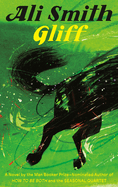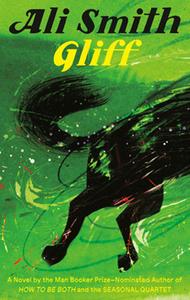
 The joy and surprise of finally encountering a long-celebrated writer feels almost physical--a sharp reminder of all the great work that could so easily get missed. For a newcomer, reading Gliff by Booker Prize-nominated Ali Smith (Autumn; How to Be Both) is like that. This is a marvel of a book, a tale that manages both to distill and distort the present to project a sobering yet hopeful view to an uncanny future where surveillance is king and one's personal data determines their fate.
The joy and surprise of finally encountering a long-celebrated writer feels almost physical--a sharp reminder of all the great work that could so easily get missed. For a newcomer, reading Gliff by Booker Prize-nominated Ali Smith (Autumn; How to Be Both) is like that. This is a marvel of a book, a tale that manages both to distill and distort the present to project a sobering yet hopeful view to an uncanny future where surveillance is king and one's personal data determines their fate.
At the start, Gliff is a bit like peering in the windows of a house and finding familiar furniture and people and languages being spoken, but none of it makes sense. Smith's luminous prose keeps readers from turning away, and they instead remain locked on a scene that, to Smith's great credit, does become clear--startlingly so. Until then, the reader must wonder: Who are these children? Why must their mother work in this fancy hotel? And why must they quiet their questions and leave her there, departing "like we were guests who'd been quite nice to her" as she hugs them "separately, polite, goodbye."
These will not be the only questions, of course. The narrator remains unnamed for a third of the book and then is found to alternate between two names--Briar and Brice--noting matter-of-factly: "Sometimes I get called one of those names, sometimes the other." There is an ominous red line that keeps being painted around places and later even people with no explanation. There is the boy named Colon who asks Briar's sister, Rose, "Do they do data differently where you're from?" before explaining he's the youngest designated data collector, "locally I mean."
Repeatedly, the tale establishes something that seems utterly foreign until the moment it clicks into place as a very possible reality in the future. Rather than being terrifying, however, Gliff is driven by an energetic hope for better, standing in reckless defiance of the very picture it paints. Like the children's mother, who knows telling "the truth meant they'd have to change what they were doing, and they didn't want to," Gliff tells a certain kind of truth--one that may push readers to consider the things they don't yet want to change despite the harm they are doing. A challenging book in every sense of the word, Gliff is tremendously clever and equally full of heart. Read it and think. --Sara Beth West, freelance reviewer and librarian
Shelf Talker: Ali Smith's Gliff projects an uncanny near future where everything feels foreign yet eerily familiar, offering an inventive resistance to the creep of big tech and data harvesting so common today.

